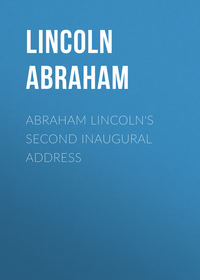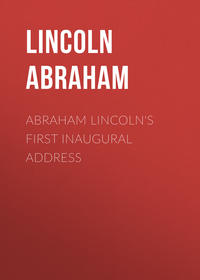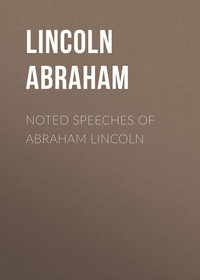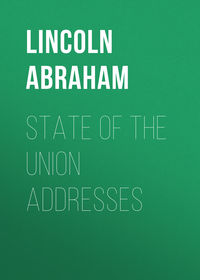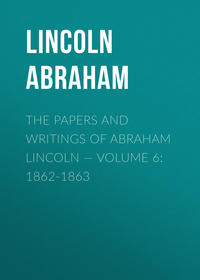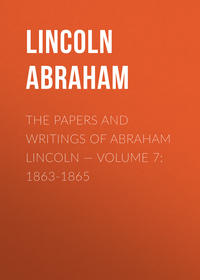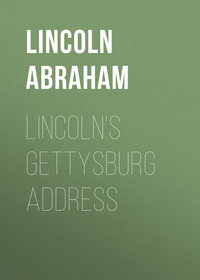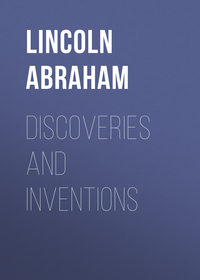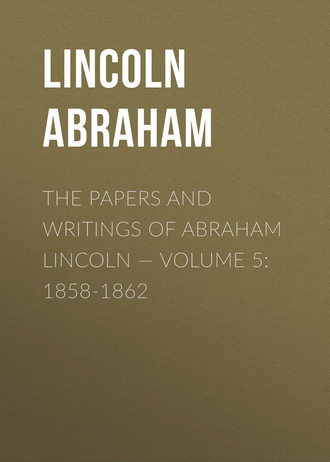 полная версия
полная версияThe Papers And Writings Of Abraham Lincoln — Volume 5: 1858-1862
ADDRESS TO THE GERMAN CLUB OF CINCINNATI, OHIO,
FEBRUARY 12, 1861Mr. CHAIRMAN: — I thank you and those whom you represent for the compliment you have paid me by tendering me this address. In so far as there is an allusion to our present national difficulties, which expresses, as you have said, the views of the gentlemen present, I shall have to beg pardon for not entering fully upon the questions which the address you have now read suggests.
I deem it my duty — a duty which I owe to my constituents — to you, gentlemen, that I should wait until the last moment for a development of the present national difficulties before I express myself decidedly as to what course I shall pursue. I hope, then, not to be false to anything that you have expected of me.
I agree with you, Mr. Chairman, that the working men are the basis of all governments, for the plain reason that they are all the more numerous, and as you added that those were the sentiments of the gentlemen present, representing not only the working class, but citizens of other callings than those of the mechanic, I am happy to concur with you in these sentiments, not only of the native-born citizens, but also of the Germans and foreigners from other countries.
Mr. Chairman, I hold that while man exists it is his duty to improve not only his own condition, but to assist in ameliorating the condition of mankind; and therefore, without entering upon the details of the question, I will simply say that I am for those means which will give the greatest good to the greatest number.
In regard to the Homestead law, I have to say that, in so far as the government lands can be disposed of, I am in favor of cutting up the wild lands into parcels, so that every poor man may have a home.
In regard to the Germans and foreigners, I esteem them no better than other people, nor any worse. It is not my nature, when I see a people borne down by the weight of their shackles — the oppression of tyranny — to make their life more bitter by heaping upon them greater burdens; but rather would I do all in my power to raise the yoke than to add anything that would tend to crush them.
Inasmuch as our own country is extensive and new, and the countries of Europe are densely populated, if there are any abroad who desire to make this the land of their adoption, it is not in my heart to throw aught in their way to prevent them from coming to the United States.
Mr. Chairman and gentlemen, I will bid you an affectionate farewell.
ADDRESS TO THE LEGISLATURE OF OHIO AT COLUMBUS
FEBRUARY 13, 1861Mr. PRESIDENT AND Mr. SPEAKER, AND GENTLEMEN OF THE GENERAL ASSEMBLY OF OHIO: — It is true, as has been said by the president of the Senate, that very great responsibility rests upon me in the position to which the votes of the American people have called me. I am deeply sensible of that weighty responsibility. I cannot but know what you all know, that without a name, perhaps without a reason why I should have a name, there has fallen upon me a task such as did not rest even upon the Father of his Country; and so feeling, I can turn and look for that support without which it will be impossible for me to perform that great task. I turn, then, and look to the American people and to that God who has never forsaken them. Allusion has been made to the interest felt in relation to the policy of the new administration. In this I have received from some a degree of credit for having kept silence, and from others some deprecation. I still think that I was right.
In the varying and repeatedly shifting scenes of the present, and without a precedent which could enable me to judge by the past, it has seemed fitting that before speaking upon the difficulties of the country I should have gained a view of the whole field, being at liberty to modify and change the course of policy as future events may make a change necessary.
I have not maintained silence from any want of real anxiety. It is a good thing that there is no more than anxiety, for there is nothing going wrong. It is a consoling circumstance that when we look out there is nothing that really hurts anybody. We entertain different views upon political questions, but nobody is suffering anything. This is a most consoling circumstance, and from it we may conclude that all we want is time, patience, and a reliance on that God who has never forsaken this people.
Fellow-citizens, what I have said I have said altogether extemporaneously, and I will now come to a close.
ADDRESS AT STEUBENVILLE, OHIO,
FEBRUARY 14, 1861I fear that the great confidence placed in my ability is unfounded. Indeed, I am sure it is. Encompassed by vast difficulties as I am, nothing shall be wanting on my part, if sustained by God and the American people. I believe the devotion to the Constitution is equally great on both sides of the river. It is only the different understanding of that instrument that causes difficulty. The only dispute on both sides is, "What are their rights?" If the majority should not rule, who would be the judge? Where is such a judge to be found? We should all be bound by the majority of the American people; if not, then the minority must control. Would that be right? Would it be just or generous? Assuredly not. I reiterate that the majority should rule. If I adopt a wrong policy, the opportunity for condemnation will occur in four years' time. Then I can be turned out, and a better man with better views put in my place.
ADDRESS AT PITTSBURGH, PENNSYLVANIA
FEBRUARY 15, 1861I most cordially thank his Honor Mayor Wilson, and the citizens of Pittsburg generally, for their flattering reception. I am the more grateful because I know that it is not given to me alone, but to the cause I represent, which clearly proves to me their good-will, and that sincere feeling is at the bottom of it. And here I may remark that in every short address I have made to the people, in every crowd through which I have passed of late, some allusion has been made to the present distracted condition of the country. It is natural to expect that I should say something on this subject; but to touch upon it at all would involve an elaborate discussion of a great many questions and circumstances, requiring more time than I can at present command, and would, perhaps, unnecessarily commit me upon matters which have not yet fully developed themselves. The condition of the country is an extraordinary one, and fills the mind of every patriot with anxiety. It is my intention to give this subject all the consideration I possibly can before specially deciding in regard to it, so that when I do speak it may be as nearly right as possible. When I do speak I hope I may say nothing in opposition to the spirit of the Constitution, contrary to the integrity of the Union, or which will prove inimical to the liberties of the people, or to the peace of the whole country. And furthermore, when the time arrives for me to speak on this great subject, I hope I may say nothing to disappoint the people generally throughout the country, especially if the expectation has been based upon anything which I may have heretofore said. Notwithstanding the troubles across the river [the speaker pointing southwardly across the Monongahela, and smiling], there is no crisis but an artificial one. What is there now to warrant the condition of affairs presented by our friends over the river? Take even their own view of the questions involved, and there is nothing to justify the course they are pursuing. I repeat, then, there is no crisis, excepting such a one as may be gotten up at any time by turbulent men aided by designing politicians, My advice to them, under such circumstances, is to keep cool. If the great American people only keep their temper on both sides of the line, the troubles will come to an end, and the question which now distracts the country will be settled, just as surely as all other difficulties of a like character which have originated in this government have been adjusted. Let the people on both sides keep their self-possession, and just as other clouds have cleared away in due time, so will this great nation continue to prosper as heretofore. But, fellow-citizens, I have spoken longer on this subject than I intended at the outset.
It is often said that the tariff is the specialty of Pennsylvania. Assuming that direct taxation is not to be adopted, the tariff question must be as durable as the government itself. It is a question of national housekeeping. It is to the government what replenishing the meal-tub is to the family. Every varying circumstances will require frequent modifications as to the amount needed and the sources of supply. So far there is little difference of opinion among the people. It is as to whether, and how far, duties on imports shall be adjusted to favor home production in the home market, that controversy begins. One party insists that such adjustment oppresses one class for the advantage of another; while the other party argues that, with all its incidents, in the long run all classes are benefited. In the Chicago platform there is a plank upon this subject which should be a general law to the incoming administration. We should do neither more nor less than we gave the people reason to believe we would when they gave us their votes. Permit me, fellow-citizens, to read the tariff plank of the Chicago platform, or rather have it read in your hearing by one who has younger eyes.
[Mr. Lincoln's private secretary then read Section 12 of the Chicago platform, as follows:]
"That, while providing revenue for the support of the General Government by duties upon imports, sound policy requires such an adjustment of these imposts as will encourage the development of the industrial interest of the whole country; and we commend that policy of national exchanges which secures to working-men liberal wages, to agriculture remunerating prices, to mechanics and manufacturers adequate return for their skill, labor, and enterprise, and to the nation commercial prosperity and independence."
As with all general propositions, doubtless, there will be shades of difference in construing this. I have by no means a thoroughly matured judgment upon this subject, especially as to details; some general ideas are about all. I have long thought it would be to our advantage to produce any necessary article at home which can be made of as good quality and with as little labor at home as abroad, at least by the difference of the carrying from abroad. In such case the carrying is demonstrably a dead loss of labor. For instance, labor being the true standard of value, is it not plain that if equal labor get a bar of railroad iron out of a mine in England and another out of a mine in Pennsylvania, each can be laid down in a track at home cheaper than they could exchange countries, at least by the carriage? If there be a present cause why one can be both made and carried cheaper in money price than the other can be made without carrying, that cause is an unnatural and injurious one, and ought gradually, if not rapidly, to be removed. The condition of the treasury at this time would seem to render an early revision of the tariff indispensable. The Morrill [tariff] bill, now pending before Congress, may or may not become a law. I am not posted as to its particular provisions, but if they are generally satisfactory, and the bill shall now pass, there will be an end for the present. If, however, it shall not pass, I suppose the whole subject will be one of the most pressing and important for the next Congress. By the Constitution, the executive may recommend measures which he may think proper, and he may veto those he thinks improper, and it is supposed that he may add to these certain indirect influences to affect the action of Congress. My political education strongly inclines me against a very free use of any of these means by the executive to control the legislation of the country. As a rule, I think it better that Congress should originate as well as perfect its measures without external bias. I therefore would rather recommend to every gentleman who knows he is to be a member of the next Congress to take an enlarged view, and post himself thoroughly, so as to contribute his part to such an adjustment of the tariff as shall produce a sufficient revenue, and in its other bearings, so far as possible, be just and equal to all sections of the country and classes of the people.
ADDRESS AT CLEVELAND, OHIO,
FEBRUARY 15, 1861Mr. CHAIRMAN AND FELLOW-CITIZENS OF CLEVELAND: — We have been marching about two miles through snow, rain, and deep mud. The large numbers that have turned out under these circumstances testify that you are in earnest about something or other. But do I think so meanly of you as to suppose that that earnestness is about me personally? I would be doing you an injustice to suppose you did. You have assembled to testify your respect for the Union, the Constitution, and the laws; and here let me say that it is with you, the people, to advance the great cause of the Union and the Constitution, and not with any one man. It rests with you alone. This fact is strongly impressed upon my mind at present. In a community like this, whose appearance testifies to their intelligence, I am convinced that the cause of liberty and the Union can never be in danger. Frequent allusion is made to the excitement at present existing in our national politics, and it is as well that I should also allude to it here. I think that there is no occasion for any excitement. 'The crisis, as it is called, is altogether an artificial crisis. In all parts of the nation there are differences of opinion on politics. There are differences of opinion even here. You did not all vote for the person who now addresses you. What is happening now will not hurt those who are farther away from here. Have they not all their rights now as they ever have had? Do they not have their fugitive slaves returned now as ever? Have they not the same Constitution that they have lived under for seventy-odd years? Have they not a position as citizens of this common country, and have we any power to change that position? What, then, is the matter with them? Why all this excitement? Why all these complaints?
As I said before, this crisis is all artificial! It has no foundation in facts. It is not argued up, as the saying is, and cannot, therefore, be argued down. Let it alone and it will go down of itself.
[Mr. Lincoln then said that they must be content with a few words from him, as he was tired, etc. Having been given to understand that the crowd was not all Republican, but consisted of men of all parties, he continued:]
This is as it should be. If Judge Douglas had been elected and had been here on his way to Washington, as I am to-night, the Republicans should have joined his supporters in welcoming him, just as his friends have joined with mine tonight. If all do not join now to save the good old ship of the Union this voyage, nobody will have a chance to pilot her on another voyage.
ADDRESS AT BUFFALO, NEW YORK,
FEBRUARY 16, 1861Mr. MAYOR AND FELLOW-CITIZENS OF BUFFALO AND THE STATE OF NEW YORK: — I am here to thank you briefly for this grand reception given to me, not personally, but as the representative of our great and beloved country. Your worthy mayor has been pleased to mention, in his address to me, the fortunate and agreeable journey which I have had from home, on my rather circuitous route to the Federal capital. I am very happy that he was enabled in truth to congratulate myself and company on that fact. It is true we have had nothing thus far to mar the pleasure of the trip. We have not been met alone by those who assisted in giving the election to me — I say not alone by them, but by the whole population of the country through which we have passed. This is as it should be. Had the election fallen to any other of the distinguished candidates instead of myself, under the peculiar circumstances, to say the least, it would have been proper for all citizens to have greeted him as you now greet me. It is an evidence of the devotion of the whole people to the Constitution, the Union, and the perpetuity of the liberties of this country. I am unwilling on any occasion that I should be so meanly thought of as to have it supposed for a moment that these demonstrations are tendered to me personally. They are tendered to the country, to the institutions of the country, and to the perpetuity of the liberties of the country, for which these institutions were made and created.
Your worthy mayor has thought fit to express the hope that I may be able to relieve the country from the present, or, I should say, the threatened difficulties. I am sure I bring a heart true to the work. For the ability to perform it, I must trust in that Supreme Being who has never forsaken this favored land, through the instrumentality of this great and intelligent people. Without that assistance I shall surely fail; with it, I cannot fail. When we speak of threatened difficulties to the Country, it is natural that it should be expected that something should be said by myself with regard to particular measures. Upon more mature reflection, however, others will agree with me that, when it is considered that these difficulties are without precedent, and have never been acted upon by any individual situated as I am, it is most proper I should wait and see the developments, and get all the light possible, so that when I do speak authoritatively, I may be as near right as possible. When I shall speak authoritatively, I hope to say nothing inconsistent with the Constitution, the Union, the rights of all the States, of each State, and of each section of the country, and not to disappoint the reasonable expectations of those who have confided to me their votes. In this connection allow me to say that you, as a portion of the great American people, need only to maintain your composure, stand up to your sober convictions of right, to your obligations to the Constitution, and act in accordance with those sober convictions, and the clouds now on the horizon will be dispelled, and we shall have a bright and glorious future; and when this generation has passed away, tens of thousands will inhabit this country where only thousands inhabit it now. I do not propose to address you at length; I have no voice for it. Allow me again to thank you for this magnificent reception, and bid you farewell.
ADDRESS AT ROCHESTER, NEW YORK,
FEBRUARY 18, 1861I confess myself, after having seen many large audiences since leaving home, overwhelmed with this vast number of faces at this hour of the morning. I am not vain enough to believe that you are here from any wish to see me as an individual, but because I am for the time being the representative of the American people. I could not, if I would, address you at any length. I have not the strength, even if I had the time, for a speech at each of these many interviews that are afforded me on my way to Washington. I appear merely to see you, and to let you see me, and to bid you farewell. I hope it will be understood that it is from no disinclination to oblige anybody that I do not address you at greater length.
ADDRESS AT SYRACUSE, NEW YORK,
FEBRUARY 18, 1861LADIES AND GENTLEMEN: — I See you have erected a very fine and handsome platform here for me, and I presume you expected me to speak from it. If I should go upon it, you would imagine that I was about to deliver you a much longer speech than I am. I wish you to understand that I mean no discourtesy to you by thus declining. I intend discourtesy to no one. But I wish you to understand that, though I am unwilling to go upon this platform, you are not at liberty to draw inferences concerning any other platform with which my name has been or is connected. I wish you long life and prosperity individually, and pray that with the perpetuity of those institutions under which we have all so long lived and prospered, our happiness may be secured, our future made brilliant, and the glorious destiny of our country established forever. I bid you a kind farewell.
ADDRESS AT UTICA, NEW YORK,
FEBRUARY 18, 1860LADIES AND GENTLEMEN: — I have no speech to make to you; and no time to speak in. I appear before you that I may see you, and that you may see me; and I am willing to admit that so far as the ladies are concerned I have the best of the bargain, though I wish it to be understood that I do not make the same acknowledgment concerning the men.
REPLY TO THE MAYOR OF ALBANY, NEW YORK
FEBRUARY 18, 1861MR. MAYOR: — I can hardly appropriate to myself the flattering terms in which you communicate the tender of this reception, as personal to myself. I most gratefully accept the hospitalities tendered to me, and will not detain you or the audience with any extended remarks at this time. I presume that in the two or three courses through which I shall have to go, I shall have to repeat somewhat, and I will therefore only express to you my thanks for this kind reception.
REPLY TO GOVERNOR MORGAN OF NEW YORK, AT ALBANY,
FEBRUARY 18, 1861GOVERNOR MORGAN: — I was pleased to receive an invitation to visit the capital of the great Empire State of this nation while on my way to the Federal capital. I now thank you, Mr. Governor, and you, the people of the capital of the State of New York, for this most hearty and magnificent welcome. If I am not at fault, the great Empire State at this time contains a larger population than did the whole of the United States of America at the time they achieved their national independence, and I was proud — to be invited to visit its capital, to meet its citizens, as I now have the honor to do. I am notified by your governor that this reception is tendered by citizens without distinction of party. Because of this I accept it the more gladly. In this country, and in any country where freedom of thought is tolerated, citizens attach themselves to political parties. It is but an ordinary degree of charity to attribute this act to the supposition that, in thus attaching themselves to the various parties, each man in his own judgment supposes he thereby best advances the interests of the whole country. And when an election is past it is altogether befitting a free people, as I suppose, that, until the next election, they should be one people. The reception you have extended me to-day is not given to me personally, — it should not be so, — but as the representative, for the time being, of the majority of the nation. If the election had fallen to any of the more distinguished citizens who received the support of the people, this same honor should have greeted him that greets me this day, in testimony of the universal, unanimous devotion of the whole people to the Constitution, the Union, and to the perpetual liberties of succeeding generations in this country.
I have neither the voice nor the strength to address you at any greater length. I beg you will therefore accept my most grateful thanks for this manifest devotion — not to me, but the institutions of this great and glorious country.
ADDRESS TO THE LEGISLATURE OF NEW YORK, AT ALBANY,
FEBRUARY 18, 1861MR. PRESIDENT AND GENTLEMEN OF THE GENERAL ASSEMBLY OF THE STATE OF NEW YORK: — It is with feelings of great diffidence, and, I may say, with feelings of awe, perhaps greater than I have recently experienced, that I meet you here in this place. The history of this great State, the renown of those great men who have stood here, and have spoken here, and have been heard here, all crowd around my fancy, and incline me to shrink from any attempt to address you. Yet I have some confidence given me by the generous manner in which you have invited me, and by the still more generous manner in which you have received me, to speak further. You have invited and received me without distinction of party. I cannot for a moment suppose that this has been done in any considerable degree with reference to my personal services, but that it is done in so far as I am regarded, at this time, as the representative of the majesty of this great nation. I doubt not this is the truth, and the whole truth of the case, and this is as it should be. It is much more gratifying to me that this reception has been given to me as the elected representative of a free people, than it could possibly be if tendered merely as an evidence of devotion to me, or to any one man personally.


